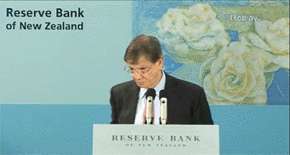
By Gareth Vaughan
Reserve Bank Governor Graeme Wheeler has spoken candidly about how his experience living in the United States helped drive a crackdown by the Reserve Bank on banks' low equity residential mortgage lending.
Wheeler was asked at a press conference, after he left the Official Cash Rate unchanged at 2.5%, what his message to would-be first home buyers who might be locked out of the housing market due to the incoming Reserve Bank restrictions was.
The Reserve Bank said last month banks must limit new residential mortgage lending at loan to value ratios (LVRs) above 80% to no more than 10% of the dollar value of their new housing lending flows from October 1. Due to some exemptions, the effective figure is expected to be about 15%. In recent months the Reserve Bank estimates banks have been doing about 30% of their housing lending via high LVR loans.
Wheeler said he understood there were issues around fairness, but offered some reflections.
"I lived in the States for 15 years. And during the period 2003 to 2007 it was an extraordinary period in the global economy," said Wheeler. "You had the fastest global growth for four decades."
'The new normal isn't going back to 2003-07'
This meant that when policy makers talked about the new normal this did not mean going back to the extraordinary period between 2003 and 2007.
"You did see very rapid increases in house prices in many, many countries. And for us (New Zealand) we had the most rapid house price inflation amongst all the OECD countries. And as I said, Auckland house prices are currently 22% above where they were in 2007," Wheeler added.
"But what I saw in the States did influence the way I did think, to some extent, about this issue. What you saw as the global financial crisis came, you saw basically 25% of America's 50 million mortgage holders with negative equity. That's a quarter of all mortgage holders had negative equity. Another 5% had equity of less than 5%."
"And you saw median real household wealth fall in the US by 39% between 2008 and 2010. Now clearly house prices were overvalued in the US. They're significantly overvalued in New Zealand, and to the extent that you did get a rapid correction in house prices, it would have very, very significant effects, we believe, for potentially the financial stability and output and employment growth in this economy."
"And the most severely effected would be those who have just come into the housing market with very low deposits."
Wheeler versus Bollard
Wheeler succeeded Alan Bollard as Reserve Bank Governor last September. From 1997 to 2010 Wheeler was employed by the World Bank. His roles there included managing director of operations, and being vice-president and treasurer. Immediately prior to getting the Reserve Bank job he ran an advisory business in the US.
His attitude to LVR restrictions contrasts with that of Bollard. In an exit interview with Bernard Hickey last year Bollard pointed to New Zealand's experiences in the 1970s when arguing against the introduction of LVR restrictions on banks' residential mortgages.
"Those sorts of direct interventions (were used) and they ended up with lots of distortions, and they ended up with people finding other ways to get money, and that's where some of our current crop of finance companies came from, ways to get around bank regulation in the 1970s," he said. "They're distortions," Bollard said last September.
3 Comments
It's all window dressing, too little too late. The big picture is what counts...
Well the Federal Reserve System through QE and other artificial monetary expansion tools, have been clever enough (through historical experience) to concentrate and hide the bulk of the inflationary effects of such artificial expansion into housing, where they knew the people would not complain because it would make them “feel” wealthy, and spend more (at least for the first phase 2002-2010) while also expanding the bank’s asset portfolios.
The governments then insure the banks, and the people then pay for it in both massive losses (often bankruptcy) and other taxes and the Fed runs away with the spoon.
(Comment section Macrobusiness Au)
If Mr Wheeler gets it wrong,
http://billmoyers.com/2013/07/22/using-eminent-domain-to-rescue-main-st…
58% drop? ouch.......
I would like Mr Wheeler to address the situation where the house prices are high, because there's no supply, and people simply have to live. You have no choice, but to have a roof over your head. And rent prices are crazy too.
I have some sympathy what Mr Wheeler is trying to achieve, but it is essentially a single guy trying to centrally plan an important bit of the economy. That cannot possibly work as Nobel Prize winner Hayek has pointed out.
If the market was allowed to work, i.e. no council who enforced strict city limits, no council extacting exorbitant development fee, no RMA processes that are abused by competitors and activists, no attempts to centrally plan the interest rate, we would not have high house prices.
We can simply point to cities like Houston and others which have none of the above, and have way lower high prizes than comparable cities who have all of them.
So Mr Wheeler's actions will have unintended consequenses. And they tend to be much worse than a young couple being able to buy a house with less than 20% down.

We welcome your comments below. If you are not already registered, please register to comment
Remember we welcome robust, respectful and insightful debate. We don't welcome abusive or defamatory comments and will de-register those repeatedly making such comments. Our current comment policy is here.